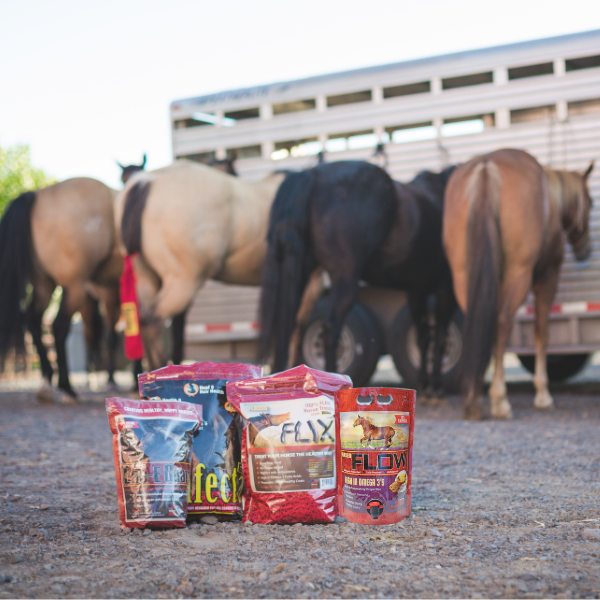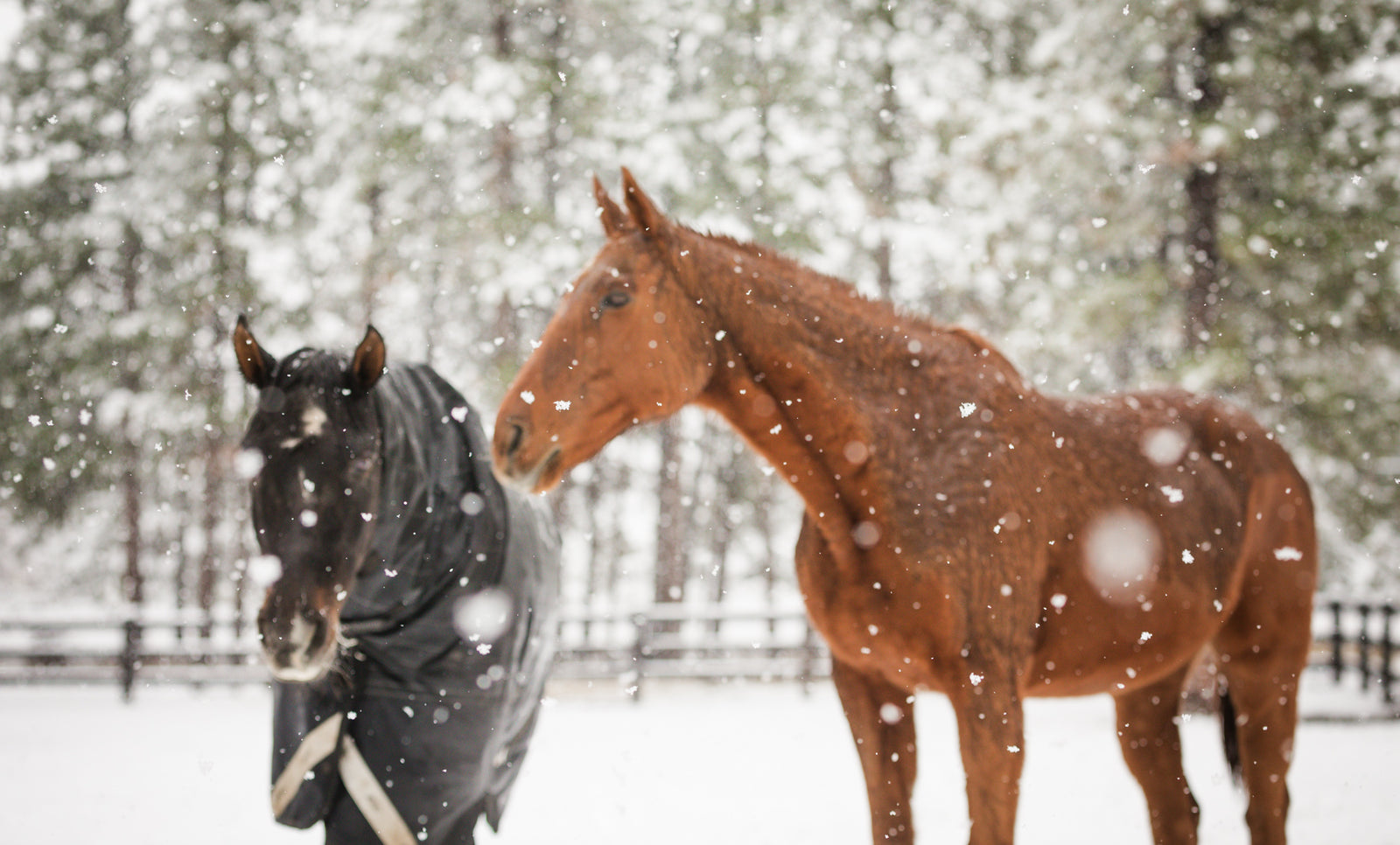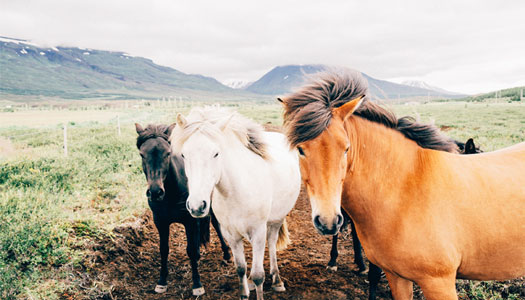Winter brings decreasing temperatures, resulting in nutrient loss from grass and the need to replace what's missing through feed. These changes to diet and routine can impact the health and integrity of the horse's hindgut. A healthy gut ensures effective digestion and absorption of nutrients, which is key for your horse's overall well-being and performance.
Understanding the Equine Digestive System
The horse digestive system can be divided into two main sections: the foregut and the hindgut. The hindgut, consisting of the cecum and colon, is the largest structure in the equine digestive tract. As a hindgut fermenter, a horse's hindgut and associated microbiome are pivotal to their health for several reasons:
-
It's where the most substantial portion of digestion happens through hindgut fermentation.
-
It houses trillions of microbes, including a large bacterial population called the microbiota, which plays a significant role in the digestive process and affects the horse's overall well-being.
-
The microbiota help digest high fiber content from grass and feed through fermentation, producing volatile fatty acids that act as a primary energy source and releasing heat to keep horses warm from the inside out.
-
Many systems rely on a healthy hindgut: The horse's ability to perform and its general health depend on the energy that results from efficient digestion.
-
Hydration: The hindgut and fibrous material within it provide a water reservoir for the horse.
-
Electrolyte balance: The hindgut and fibrous feeds serve as a resource of electrolytes that can be absorbed when needed.
-
Vitamin supply: The bacteria that ferment fibrous feeds also produce essential B vitamins and vitamin K.
-
Immune function and behavior: The gut microbiome plays a role in controlling immune function and producing hormones that affect behavior.
Horses struggling with common hindgut problems may experience dehydration, reduced appetite, poor hoof condition, impaired immune function, and attitude changes.
Horse Digestive System Diagram:

The Importance of Forage
The horse’s digestive system is sensitive and highly specialized for constant grazing
and movement. Forage should always be the foundation of a horse’s diet, which during the winter can be provided as hay. Plenty of good quality forage throughout the winter helps to keep the digestive tract functioning well and keeps the all-important hindgut microbes happy and healthy. To maximize hindgut health, forage should be fed on an ad-lib basis so the horse has constant access to it. The use of slow feeders or hay nets can help to ensure that forage is aways available. You can read more about thebenefits of continuous foraging here.
Managing the Hard Keepers

Horses struggling to hold weight and condition during the winter will need extra feed but to keep their hindgut healthy it is important to ensure that starch from cereals is kept to a minimum. Horses have a limited capacity to digest starch in their small intestine. Undigested excess starch from cereals can reach the hindgut and cause imbalances in the microbiome, leading to microbial dysbiosis, which can result in hindgut acidosis.
Hindgut acidosis is a consequence of the rapid growth of certain types of lactic acid-producing bacteria. The increased lactic acid causes a drop in pH creating a more acidic environment which results in some of the beneficial fiber-digesting microbes dying off meaning digestive efficiency decreases. This leads to inflammation of the hindgut membrane and potentially laminitis or colic.
For the hard-keepers consider supplementing your horse with Super Weight Gain which incudes a complete prebiotic and probiotic supplement which promotes beneficial bacteria in the hindgut which helps in breaking down food and absorbing essential nutrients more efficiently, leading to improved overall health.
With the combination of extruded full-fat soybeans, probiotics, prebiotics, and live yeast, a full dose of vitamins and minerals including Selenium and Vitamin E, Super Weight Gain is the perfect combination to combat all of the challenges facing your horse thus Winter.
The Importance of Hydration
In winter, horses are naturally inclined to drink less. Water is key for a healthy

hindgut because it helps stimulate gut motility and keeps the hindgut contents hydrated, reducing the risk of impaction colic. Here are some hydration strategies to improve your horse's water intake:
-
Use heated automatic waterers, immersion heaters, or insulated buckets.
-
Warm the water to around 66 degrees Fahrenheit, as research shows horses drink 40% more water at this temperature compared to near-freezing temperatures.
-
Ensure your horse has free-choice salt available.
-
Soak pelleted feed.
-
Check their water regularly to ensure it hasn't iced over or become too cold.
-
Always provide clean water regardless of temperature.
Conclusion: Optimizing Equine Gut Health in Winter
Optimizing your horse's gastrointestinal health is essential during winter. Probiotics, prebiotics, and live yeast cultures can help stabilize the equine GI tract and support overall digestive health. This is especially true for hard keepers and senior horses who tend to struggle the most with maintaining weight during the winter months. Here's how you can ensure your horse's gut is in top shape:
-
Provide probiotics, which are live bacteria that help stabilize the gastrointestinal tract and fend off disease-causing microorganisms.
-
Ensure your gut supplement contains prebiotics to nourish and promote the growth of beneficial microorganisms in the gastrointestinal tract.
-
Choose a gut supplement with live yeast cultures to stabilize the cecum's pH balance and further support the gastrointestinal tract.
-
Feed a high-protein and high-fat diet to promote proper digestive function.
-
Regularly monitor your horse's digestive health, watching for signs of discomfort or irregularities in fecal consistency.
Remember to make any changes to your horse's diet gradually to help prevent digestive upset. It's advised to make changes over 2-3 weeks, introducing new feed slowly to allow the gut microbes time to adjust and maintain a healthy hindgut throughout the winter season.
By focusing on proper feeding management, maintaining forage quality, and implementing effective hydration strategies, you can support your horse's digestive health and overall well-being during the challenging winter months.






Leave a comment (all fields required)